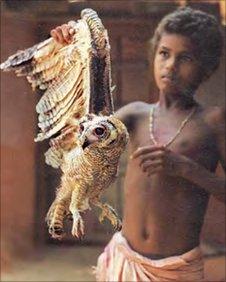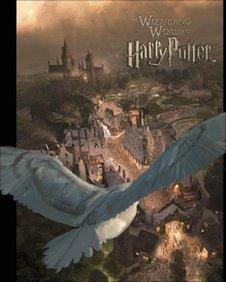Harry Potter blamed for fuelling India owls' demise
- Published

The report warns that India's owl population is under pressure
Indian Environment Minister Jairam Ramesh has blamed fans of boy wizard Harry Potter for their role in the dwindling number of wild owls.
He said that Harry Potter books and films featuring his feathered friend Hedwig are popular in India and had contributed towards the demise of owls.
Mr Ramesh said there had been an increase in people wanting to buy them from illegal bird traders.
He was speaking to mark the launch of a report on India's owl population.
Written by the leading conservation group, Traffic, the report calls for tougher measures to protect owls ahead of Diwali, the Hindu festival of lights, which is being celebrated on Friday.
It says that thousands of owls are traditionally sacrificed on "auspicious" occasions.
'Strangest demands'
"Following Harry Potter, there seems to be a strange fascination even among the urban middle classes for presenting their children with owls," Mr Ramesh said.

Owls play an important role in Harry Potter films
Harry Potter publishers Bloomsbury declined to comment on Mr Ramesh's assertions.
The report's author, Abrar Ahmed, wrote that he decided to investigate the owl trade after being asked by a friend to procure a live white-coloured owl for her son's Harry Potter-themed 10th birthday party.
"This was probably one of the strangest demands made to me as an ornithologist," he wrote.
His research found that growing number of owls, a highly endangered species in India, are now being trapped, traded or killed in black magic rituals.
The report says that half of India's 30 species of owl can be found on sale in markets.
Others are killed for medicinal purposes.
"The sacrifice of owls on auspicious occasions appears to be a regular practice and [there could be] a possible increase in trade and sacrifices around Diwali," the Imperilled Custodians of the Night report, external says.
'Ignorant superstition'
Diwali is one of the main events on the Hindu calendar and is also marked by Sikhs. It celebrates the triumph of good over evil.
Traffic's concern over the plight of owls in the run-up to the occasion is supported by WWF India, the International Union for the Conservation of Nature and Mr Ramesh.
"Diwali should be a time for celebration across our nation, not one when our wildlife is plundered to feed ignorant superstition," he said.
"India's wildlife already faces many pressures; the additional burden of being killed out of ignorance and fear is not one that has any place in our modern society.
"Owls are as important to our ecosystem as tigers are.
"It is important that the threat to them during Diwali is brought to light and concrete ground action undertaken to curb such activities."
The Traffic report also highlights the killing of owls in "black magic and sorcery driven by superstition, totems and taboos".
It says that this is one of "the prime drivers of the covert owl trade".
The problem can only be tackled by better law enforcement, the report says, and more awareness of the "beneficial and vital role of owls in the ecosystem" - especially their benefit to farmers through their "predation of rodents and other crop pests".
The report says that black magic practitioners prescribe the use of owls and their body parts for ceremonial pujas and rituals.